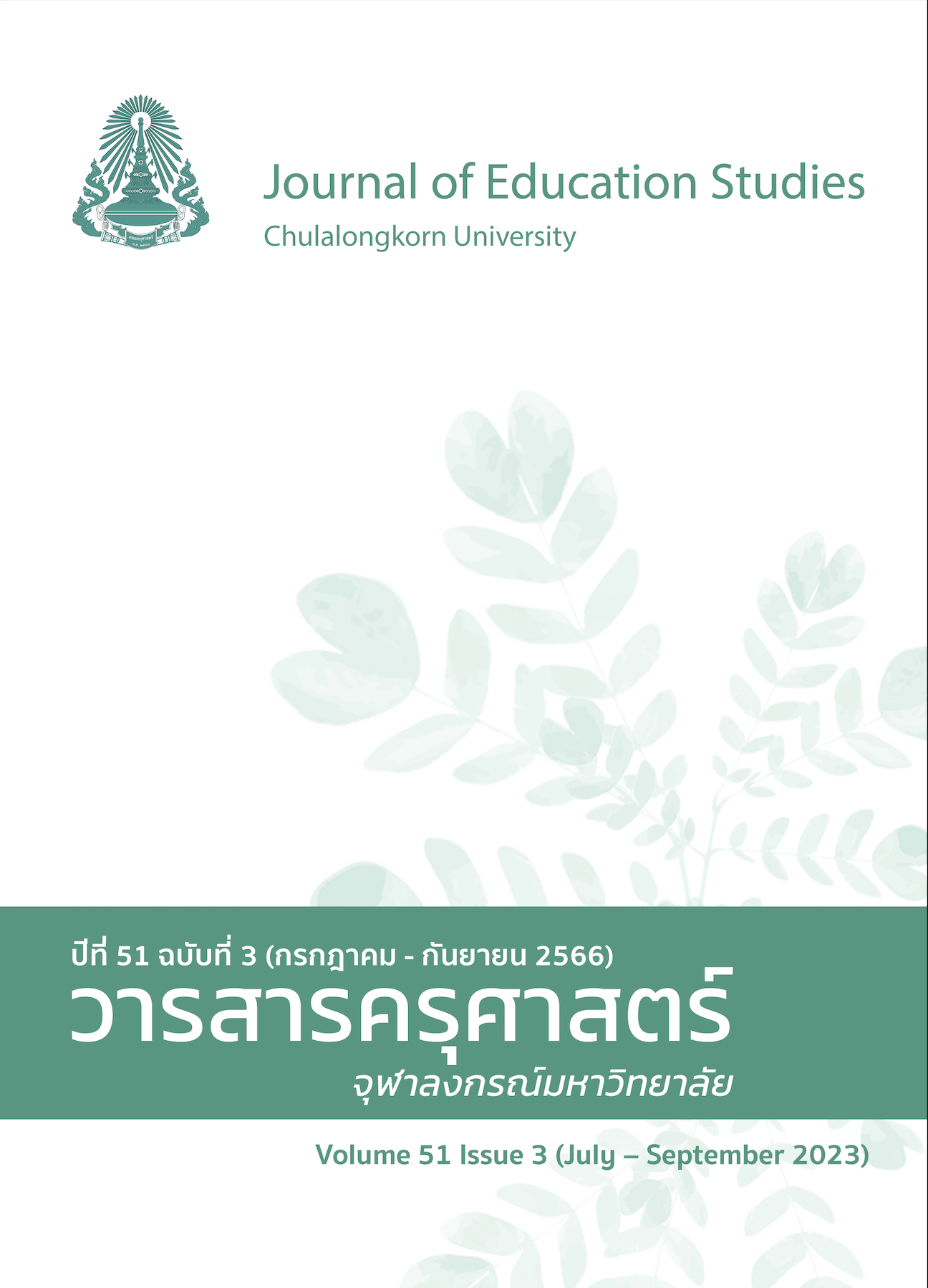The development of learning activities to promote learning achievement in Thai for communication using the concept of contemplative education supplemented by social engineers for undergraduate students
DOI:
https://doi.org/10.14456/educu.2023.21Keywords:
Achievement in Thai for language communication, contemplative education, social engineerAbstract
The purposes of this research were to: 1) develop learning activities to enhance learning achievement in Thai language for communication according to contemplative education with social engineers for undergraduate students to meet the standard efficiency index set at 80/80. 2) compare the learning achievement of students before and after taking the treatment, and 3) study the students' satisfaction with learning activities.
The research instruments were learning activity packages, a learning achievement test, and a satisfaction assessment form. The sample group in this research consisted of 50 students enrolled in the first semester of the academic year 2022 in a Thai language for communication course, selected by the cluster sampling method. The statistics used to analyze the collected data were percentage, mean, standard deviation, t-test, and descriptive statistics.
The results of this research indicated that: 1) the effectiveness of learning activities was found to be at the effectiveness standard of 82.63/81.89. 2) The posttest of the learning achievement was higher than the pretest at a significant level of.05, and 3) the students' satisfaction with learning activities was at a high level (M = 4.44, SD = 0.06)
References
เกสสิณี ตรีพงศ์พันธุ์. (2564), การบูรณาการวิศวกรสังคมสำหรับการท่องเที่ยววิถีชีวิตในชนบทของไทยสู่ความยั่งยืน. วารสารบริหารธุรกิจและสังคมศาสตร์ มหาวิทยาลัยรามคำแหง, 4(3), 16-32.
ชัยยงค์ พรหมวงศ์. (2556). การทดสอบประสิทธิภาพสื่อหรือชุดการสอน. วารสารศิลปากรศึกษาศาสตร์วิจัย, 5(1), 7-20.
ปรัชญ์ วีสเพ็ญ และ ชมพูนุท เมฆเมืองทอง. (2556). การพัฒนากิจกรรมการจัดการเรียนรู้แบบห้องเรียนกลับด้านเพื่อส่งเสริมผลสัมฤทธิ์ทางการเรียนเรื่องสถิติวิจัยในชั้นเรียนของนักศึกษาสาขาภาษาไทยเพื่อการสื่อสาร. วารสารสังคมศาสตร์เพื่อการพัฒนาท้องถิ่น มหาวิทยาลัยราชภัฏมหาสารคาม,6(1), 80-89.
ปราณี อ่อนศรี. (2557). จิตตปัญญาศึกษา : การศึกษาเพื่อการพัฒนามนุษย์ในศตวรรษที่ 21. วารสารพยาบาลทหารบก, 15(1), 7-11.
พลกฤต แสงอาวุธ และ บุษยมาศ เหมณี. (2565). การนำนโยบายการพัฒนาทักษะวิศวกรสังคมไปปฏิบัติศึกษาเฉพาะกรณีโครงการยุวชน มรส. สร้างชาติ. วารสารวิชาการธรรมทรรศน์, 22(2), 71-82.
พิชญาวี ทองกลาง และ วรกุล เชวงกูล. (2564). การศึกษาผลสัมฤทธิ์ทางการเรียนรายวิชาภาษาไทยเพื่อการสื่อสารหมวดวิชาศึกษาทั่วไปของนักศึกษาชั้นปีที่ 1 มหาวิทยาลัยราชภัฏนครราชสีมา โดยใช้รูปแบบการจัดการเรียนรู้แบบผสมผสาน. วารสารครุศาสตร์ จุุฬาลงกรณ์์มหาวิทยาลัย, 49(1), 1-17.
ภูสิทธ์ ภูคำชะโนด. (2563). กระบวนทัศน์พัฒนาสังคมพื้นฐาน. กรุงเทพฯ: มหาวิทยาลัยราชภัฏสวนสุนันทา.
มหาวิทยาลัยราชภัฏอุดรธานี. (2562). หลักสูตรสำนักวิชาศึกษาทั่วไป มหาวิทยาลัยราชภัฏอุดรธานี. อุดรธานี: มหาวิทยาลัยราชภัฏอุดรธานี.
. (2565). รายงานการประชุมสะท้อนผลการเรียนรู้ประจำปีการศึกษา 2564, 17 มีนาคม พ.ศ. 2565 ณ ห้องประชุมสำนักวิชาศึกษาทั่วไป. อุดรธานี: มหาวิทยาลัยราชภัฏอุดรธานี.
มานิตย์ กลางขอนนอก และ สมหวัง แก้วสุฟอง. (2564). แนวคิดประโยชน์อย่างแท้จริงในทฤษฎีวิศวกรรมสังคมของรอสโค พาวนด์. วารสารปณิธาน, 17(2), 73-98.
เมธินี วงศ์วานิช รัมภกาภรณ์. (2558). การจัดการเรียนการสอนตามแนวคิดจิตตปัญญาศึกษา: การสังเคราะห์งานวิจัย. วารสารวิชาการมหาวิทยาลัยอีสเทิร์นเอเชีย ฉบับสังคมศาสตร์และมนุษยศาสตร์, 5(2), 328-342.
อติพร ทองหล่อ. (2564). ผลของการใช้แนวคิดจิตตปัญญาศึกษาในการจัดกิจกรรมการเรียนรู้ ต่อการตระหนัก รู้ในตนเองและการเข้าใจความรู้สึกผู้อื่นของนักศึกษาพยาบาล. ราชาวดีสารวิทยาลัยพยาบาลบรมราชชนนี สุรินทร์, 11(1), 91-106.
อังคณา อ่อนธานี. (2562). การพัฒนารูปแบบการเรียนการสอนตามแนวคิดจิตตปัญญาศึกษาที่เสริมสร้างความสามารถใน
การฟันฝ่าอุปสรรค (AQ) สำหรับนักศึกษาครู. วารสารศึกษาศาสตร์ มหาวิทยาลัยนเรศวร, 21(3), 326-341.
อัชฌา ชื่นบุญ. (2563). การศึกษาคุณภาพการจัดการเรียนการสอนในหมวดวิชาศึกษาทั่วไปของหลักสูตรปริญญาตรีวิทยาลัยเซนต์หลุยส์. วารสารวิจัยและพัฒนาหลักสูตร, 10(1), 110-124.
Joyce, B., Weil, M. and Calhoun, E. (2015). Model of Teaching. 9th ed. London: Allyn and Bacon.
Likert, R. (1967). The Method of Constructing and Attitude Scale. In Reading in Fishbeic, M (Ed.), Attitude Theory and Measurement (pp. 90-95). New York: Wiley & Son.
Manurung, R., Ismail, R., & Muda, I. (2019). Social engineering model to improve the ability of tourism-based society in managing the local potential around Lake Toba in North Sumatera. International Journal of Scientific & Technology Research, 8(8), 186-191.
Rose, G. (2012). Visual Methodologies: An Introduction to The Interpretation of Visual Materials.3rd ed. London: Sage.
Hart, T. (2004). Opening the Contemplative Mind in the Classroom. Journal of Transformative Education, 2(1), 28 -46.
Downloads
Published
How to Cite
Issue
Section
License

This work is licensed under a Creative Commons Attribution-NonCommercial-NoDerivatives 4.0 International License.




